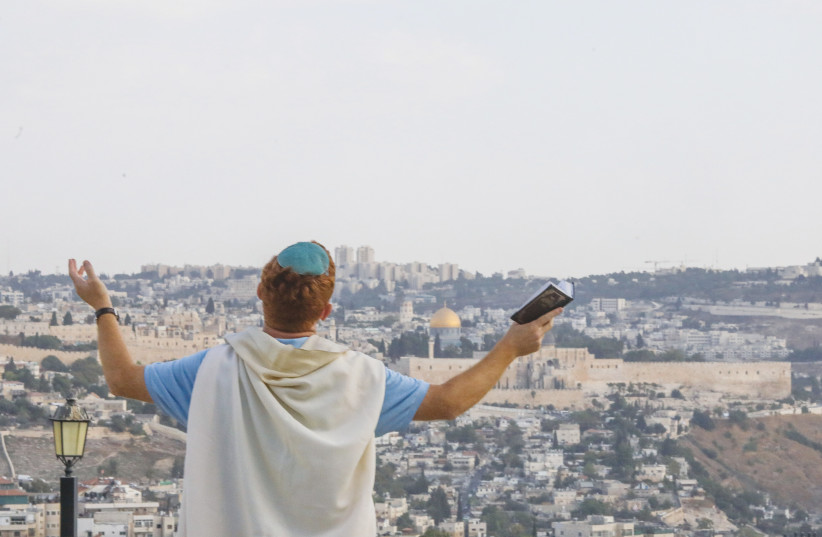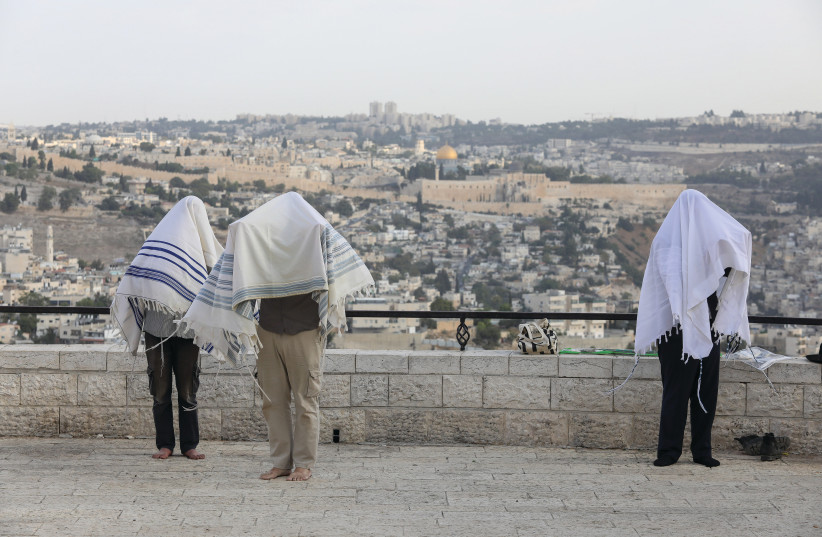A teacher of mine once told me the following story: His wife got a call from a friend whose child was in the same first grade class as theirs was, in their neighborhood mamlakhti-dati (state-run religious) school. The friend’s child came home extremely upset because the teacher had told the class that, depending ON how we’ve behaved, God writes us into a book of life or death on Rosh Hashanah and seals the book on Yom Kippur.
Curious to know how her child had reacted to this, my teacher’s wife called him over and asked, “What do you think about this idea that God will write you into a book of life or death?” With youthful (some might also say Israeli?) brashness, the boy replied, “Nu, she-yikhtov!” “So? Let God write me up!”
This boy’s insouciance is refreshing, but it hardly reflects the profound ambivalence, even repugnance, I suspect many of us feel toward this image of being written into the moral accounting ledger in the sky. It’s unhelpful that it gets repeated like a mantra in new year’s prayers such as the somber Unetaneh Tokef.
How to find meaning in prayer when God allows for injustice
As the new year begins, we need to feel that God is on our side, helping us to wipe out the mistakes of the past, not etching them in God’s long, perhaps punitive, memory. What makes the idea even more difficult to embrace is its reward-and-punishment theology that is so agonizingly out of step with human reality.
Having slogged through the devastation of COVID, we’re aware of how cruel a belief in God as “master of the cosmic ledger book” can be. How many good people do we know who died from the disease or who have died so tragically in other ways, while some truly evil people literally get away with murder, all the while living long and prospering?
How is it possible to find meaning and solace in the High Holy Day prayers when they present us with ideas like this one? A literalist reading of such ideas can lead some of us to accept them blindly, with no sensitivity to the problems of evil and injustice; it can lead others of us to reject them outright without considering what they have to offer.
The first literalist approach makes us morally and intellectually dishonest. The second makes us spiritually shallow. Let me suggest that we can meaningfully engage these ideas with kavanah (spiritual intent and depth) by reading and praying them as what they are: poetry filled with evocative metaphors.
A good place to begin our exploration of this “moral accounts ledger” metaphor is its source in the Babylonian Talmud, Tractate Rosh Hashanah 16b. (translation from Sefaria):
Rabbi Kruspedai said that Rabbi Yohanan said: Three books are opened on Rosh Hashanah before the Holy One, Blessed be God: One of wholly wicked people, and one of wholly righteous people, and one of middling people whose good and bad deeds are equally balanced.
Wholly righteous people are immediately written and sealed for life; wholly wicked people are immediately written and sealed for death; and middling people are left with their judgment suspended from Rosh Hashanah until Yom Kippur, their fate remaining undecided.
If they merit, through the good deeds and mitzvot that they perform during this period, they are written for life; if they do not so merit, they are written for death.
I suggest that Rabbi Kruspedai is doing what rabbis try to do best: teaching us a complex or abstract set of ideas using a concrete story or image. It fires our imaginations and helps us to contemplate those ideas more deeply.
In an almost tongue-in-cheek manner, he’s reminding us about the most important book of the three that is open before God and us: the book for middling people, which includes the vast majority of us. The books of wholly righteous and wholly evil people are almost irrelevant props in his story, because almost no one is wholly anything. We’re “mixed bags,” which is why God (and hopefully each of us) gives human beings the opportunity to do better and to make changes: in the language of Jewish law, to do teshuvah.
The proverbial book “of those of us in the middle” is, as it were, open before God. God longingly awaits our answer about how it will be filled in for each of us by us, through the life- or death-affirming decisions we make. We are, to the extent that we can be, the authors of our own fates in the coming year. This powerful idea is later put forward by Unetaneh Tokef, which says that the “book” contains our own handwriting, not God’s.
Given this non-literalist reading of these ideas, let me suggest how you can pray them this High Holy Day season in a manner that is meaningful, empowering and morally demanding. Take these and other words of the mahzor seriously without taking them literally. They aren’t religious dogmas so much as spiritual invitations to deepen your self-awareness about your future and its terrifying, exhilarating open book of possibilities.
What will you write on your page of the as-yet-completed script of your life, your actions, your personal changes and decisions? Rabbi Kruspedai is asking you – all of us! – to come on an incredible journey with God and with each other. God respects and loves each of us so much that God refuses to say, “Sorry, the book is closed, you are who you are, nothing will change, you might as well die or exist in a living death.”
We who are called to emulate God should do no less for each other. Can we imagine standing before and with God as the open books that we are, can and should be?
We might say, “God, I’m terrified but hopeful of what I might make of my coming year, knowing full well that I can’t control everything that will happen to me. I don’t know if I can do this.”
“God, I’m terrified but hopeful of what I might make of my coming year, knowing full well that I can’t control everything that will happen to me. I don’t know if I can do this.”
What we might say to God on Yom Kippur
To which God, echoing as it were my teacher’s son, will respond, “Nu, she-tikhtov!” “What are you waiting for? I’m here with you. Now get writing!”
Shanah tovah.
The writer is the rabbi of Congregation Ohav Shalom and a writer living in Albany, New York. He is the author of Cain v. Abel: A Jewish Courtroom Drama (Jewish Publication Society 2020).•

